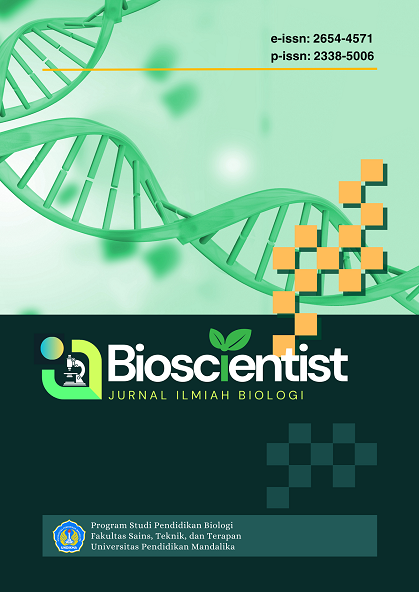Development of Human Excretory System Module Based on Problem Based Learning to Improve Student Learning Outcomes in Class XI Science
DOI:
https://doi.org/10.33394/bioscientist.v13i2.15515Keywords:
Development, module, problem-based learning, excretion, learning outcomesAbstract
This research aims to develop and test the feasibility and effectiveness of the module of human excretory system based on Problem Based Learning (PBL). The research method use is Research and Development (R&D) with the 4-D model, namely the defining stage, the design stage, the development stage, and the dissemination stage. Validation was conducted by module design experts with an average score of 93.32, material experts 92.32, learning experts 90.86, and one biology teacher of class XI 94.68, all categorized as “very feasible.†The module appeal trial shows high results with assessment categories 85.01 - 100 (highly appealing), 70.01 - 85 (appealing), 50.01-70 (less appealing), and 01.00-50 (not appealing). The results of the individual trial were 3 students at 100 (highly appealing), a small group of 10 students at 82.14 (appealing), and a limited group of 20 students at 98.75 (highly appealing). The effectiveness of the module tested through student learning outcomes using independent t test. In the cognitive aspect, the average value of the experimental class reached 96.15 (very good) with t count 2.170 > t table 1.666 and supported by a significant value of 0.033 <0.05. Affective aspects obtained a value of 94.30 (very good) with t count 2.296 > t table 1.666 supported by a significant value of 0.025 < 0.05, and psychomotor aspects reached 97.13 (very good) with t count 7.619 > t table 1.666 supported by a significant value of 0.000 < 0.05. The results of this study indicate that the developed module can be useful as an effective alternative learning media to improve students' learning outcomes.References
Abidah, A., Aklima, A., & Razak, A. (2022). Tantangan guru sekolah dasar dalam menghadapi era society 5.0. Jurnal Ilmiah Profesi Pendidikan, 7(2c), 769-776.
Arsyad, B., & Saleh, S. R. (2022). Desain Instrumen Penilaian Ranah Psikomotorik pada Pembelajaran Bahasa Arab. JAEL: Journal of Arabic Education and Linguistics, 2(2), 53-63.
Christiyoda, S., Widoretno, S., & Karyanto, P. (2016). Pengembangan modul berbasis kemampuan pemecahan masalah pada materi sistem ekskresi untuk meningkatkan berpikir kritis. Inkuiri: Jurnal Pendidikan IPA, 5(1), 74-84.
Dewi, P. Y. A., & Primayana, K. H. (2019). Effect of learning module with setting contextual teaching and learning to increase the understanding of concepts. International Journal of Education and Learning, 1(1), 19-26.
Fatimah, F., & Haikal, M. (2023). Pengembangan Modul Pembelajaran Biologi Berbasis Problem-Based Learning (PBL) pada Materi Virus untuk Siswa Kelas X SMA. Journal of Authentic Research, 2(2), 80-93.
Mesra, R. (2023). Research & Development Dalam Pendidikan. Tanjung Morawa : PT. Mifandi Mandiri Digital.
Nuroifah, N., & Bachri, B. S. (2015). Pengembangan Media Pembelajaran Berbasis Aplikasi Android Materi Sistem Ekskresi Siswa Kelas XI SMA Negeri 1 Dawarblandong Mojokerto. Jurnal Mahasiswa Teknologi Pendidikan, 6(1), 10.
Ramadhani, Y. R., Subakti, H., Masri, S., Brata, D. P. N., Salamun, S., Walukow, D. S., Haeruman, L. D., Sianipar, L. K., Sanjaya, L. A., & Fidhyallah, N. F. (2022). Pengantar Strategi Pembelajaran. Yayasan Kita Menulis.
Rombe, Y. P., -, M. M., Alberta, F., -, R. Y., & Surbakti, P. S. (2021). Pembelajaran Berbasis Masalah (Problem Based Learning) Secara Online Selama Pandemi Covid-19. Jurnal Pendidikan Kimia Undiksha, 5(2), 67
Sastrawan, K. B. (2016). Profesionalisme guru dalam upaya meningkatkan mutu pembelajaran. Jurnal Penjaminan Mutu, 2(02), 65-73.
Sawitri, D. W. (2014). Pengembangan modul keanekaragaman hayati berbasis pendekatan saintifik untuk siswa kelas X SMA. Berkala Ilmiah Pendidikan Biologi (BioEdu), 3(3).
Setyowati, A. A., Fathurahman, M., & Anwar, Z. (2020). Model Pembelajaran Problem Based Learning Berbantuan Software Geogebra Untuk Kemampuan Komunikasi Matematis Dan Self Confidence Siswa SMA. Yayasan Barcode.
Simorangkir, A., & Napitupulu, M. A. (2020). Analisis Kesulitan Belajar Siswa Pada Materi Sistem Ekskresi Manusia. Jurnal Pelita Pendidikan, 8(1). https://doi.org/10.24114/jpp.v8i1.11247
Sugiyono, M. P. P., & Kuantitatif, P. (2009). Kualitatif, dan R&D, Bandung: Alfabeta. Cet. Vii.
Suharyat, Y., Ichsan, I., Satria, E., Santosa, T. A., & Amalia, K. N. (2022). Meta-Analisis penerapan model pembelajaran problem based learning untuk meningkatkan ketrampilan abad-21 siswa dalam pembelajaran IPA. Jurnal Pendidikan dan Konseling (JPDK), 4(5), 5081-5088.
Trevathan, J. & Myers, T. 2013. Towards Online Delivery of Process-Oriented Guided Inquiry Learning Techniques in Information Technology Courses. Journal of Learning Design. (6):12. Griffith University & James Cook University.
Widayati, A., & Priantinah, D. (2023, January). Factors Influencing The Practicum Learning Outcomes in The Context of Online Learning in the Faculty of Economics, Unversitas Negeri Yogyakarta. In Unima International Conference on Social Sciences and Humanities (UNICSSH 2022) (pp. 1267-1274). Atlantis Press.
Yackel, E., Cobb, P., Wood, T. (1993). Developing A Basis for Mathematical Communication Within Small Groups. Journal for Research in Mathematics Educations. Monograph. No. 6, 33-44. Reston Va.: NCTM.
Yandi, A., Putri, A. N. K., & Putri, Y. S. K. (2023). Faktor-Faktor Yang Mempengarui Hasil Belajar Peserta Didik (Literature Review). Jurnal Pendidikan Siber Nusantara, 1(1), 13-24.













